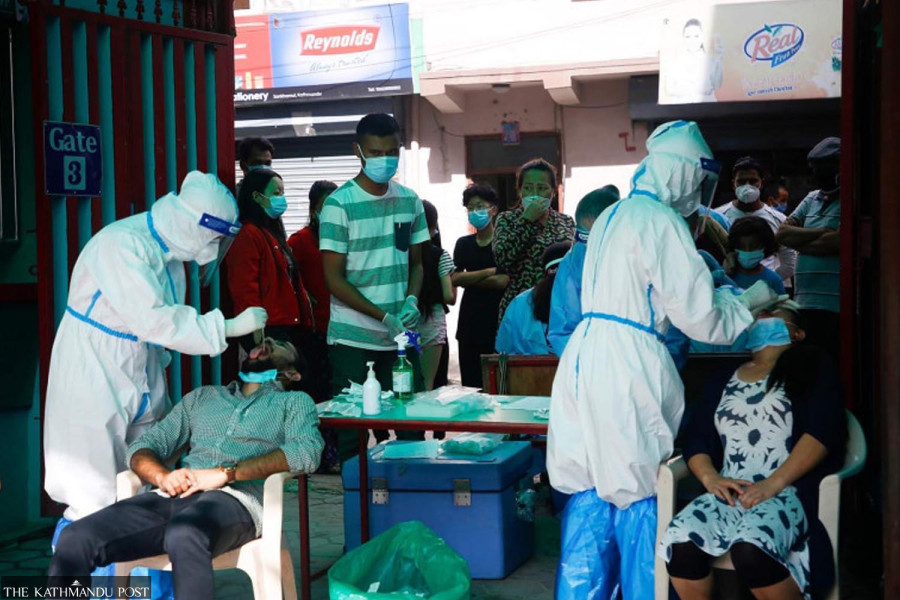Health
Lack of containment measures fuels Covid spread in community
By ignoring safety protocol, people are putting health of elderly and those without immunity at risk, doctors warn.
Arjun Poudel
While a new Covid sub-variant has been spreading unabated in communities for the past couple of weeks, no measure has been taken yet to curb the transmission.
Neither the health authorities nor the general public seem to be concerned about the high infection rate of the new variant, which is believed to be highly contagious and potentially deadly.
“The spread of a new sub-variant of Omicron is on the rise,” said Dr Rajiv Shrestha, an infectious disease expert at the Dhulikhel Hospital. “More people will get infected in the coming days. What concerns me more is that no one has taken the risk seriously. The virus variant hits the unvaccinated, elderly and immuno-compromised people harder.”
Currently, XBB.1.16 sub-variant of the Omicron has been circulating in Nepal. According to Dhulikhel Hospital, the sub-variant was detected in all nine swab samples of Covid-infected persons on which whole genome sequencing tests were carried out at the hospital on Wednesday.
“This means the new sub-variant of the virus is more contagious than the previous ones and is responsible for the current surge of infection in the country,” said Shrestha.
“People are neither taking booster shots, nor undergoing testing or isolating themselves, despite having symptoms of the infection.”
Whole-genome sequencing is a comprehensive method of analysing the entire DNA sequence of an organism’s genes.
Doctors at the hospital said that the new sub-variant might have replaced all other existing variants.
XBB.1.16 sub-variant, a hybrid lineage of two Omicron sub-variants, is also spreading in India and has the capacity to evade immunity acquired from prior infections and vaccinations.
Health authorities in Nepal had stopped carrying out free testing during the second wave of the pandemic that was triggered by the Delta variant, which killed more than 8,000 people. Along with the cessation in free testing, contact tracing, isolation and quarantining of infected persons has also stopped.
The authorities concerned also stopped enforcing mandatory mask-wearing in public places, social distancing and hand-washing. The people too gave up all such measures long ago and this has jeopardised the health of people with compromised immunity, according to experts.
At least five people have died from Covid since the new surge started in Nepal; the country reported the first of the five deaths on April 11, after a gap of 94 days. Before that, there had been a Covid-related death on January 7.
Infectious diseases experts say the authorities should focus on vaccination if they reach the conclusion that people cannot be convinced about the growing risk and the importance of following safety measures.
They say vaccination is the only reliable way to prevent severity and deaths from coronavirus infections and suggest administering second booster shots at the earliest.
Several studies, including the one carried out in Nepal, show that the immunity achieved from vaccination or infection wanes after six months of vaccination or natural immunity.
Meanwhile, officials at the Ministry of Health and Population said the ministry has requested the COVAX facility, the United Nations-backed international vaccine-sharing scheme, for an additional 1.5 million doses of Pfizer-BioNTech’s bivalent vaccine.
Currently, people above 55 years of age, health workers, pregnant women, those having compromised immunity and people suffering from chronic diseases are being administered the second booster shot.
The bivalent Covid vaccine includes a component of the original virus strain as well as a part of the Omicron variant to provide broad protection against Covid.
The vaccine is called a bivalent Covid shot as it contains two components—the original virus strain and Omicron BA.4 and BA.5 sub-variants. Doctors say a bivalent Covid vaccine may also be referred to as an “updated” Covid vaccine booster dose.
“We have requested for an additional 1.5 million doses of the vaccine from COVAX,” said Dr Abhiyan Gautam, chief of the Immunisation Section at the Family Welfare Division under the Department of Health Services. “Decision on a new priority group for the second booster shots could also be taken at the upcoming meeting of the National Immunisation Advisory Committee.”
The meeting of the expert panel on vaccination is scheduled for Sunday.
So far, 12,025 Covid-related deaths have been reported in Nepal, according to an official count.




 11.84°C Kathmandu
11.84°C Kathmandu















